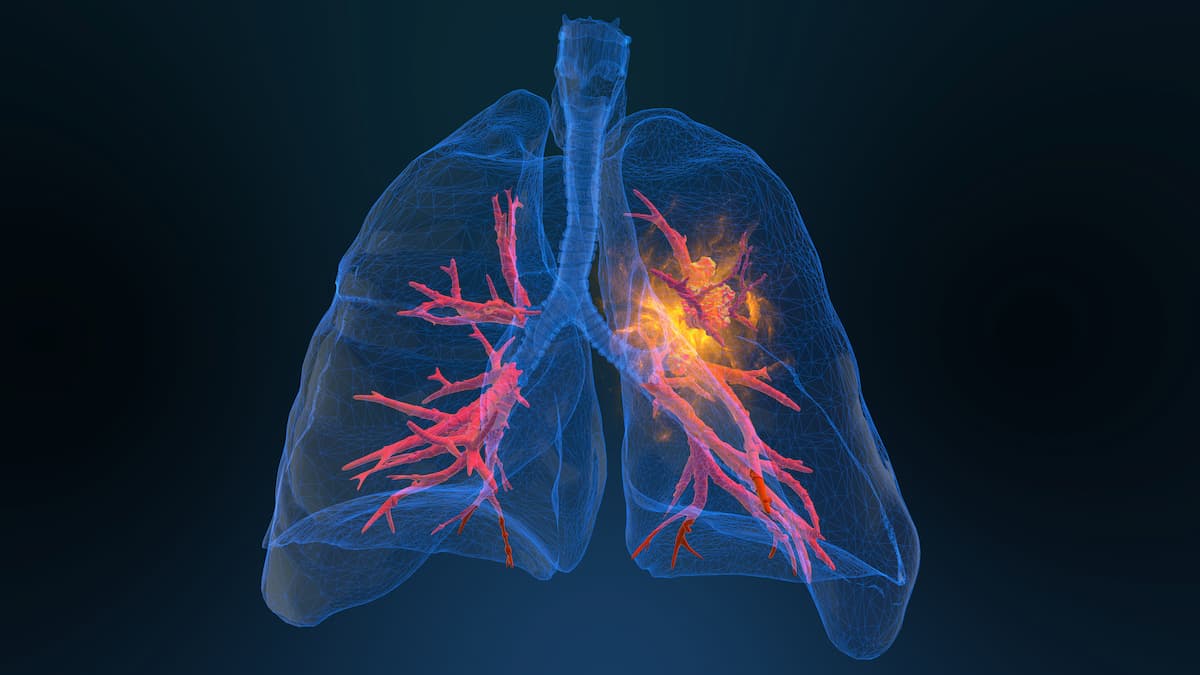Amivantamab Combo Reduces Symptom Progression in EGFR-Mutated NSCLC
Patients with EGFR-mutated NSCLC had sustained HRQOL when treated with amivantamab plus lazertinib vs osimertinib.
In August 2024, the FDA approved amivantamab/lazertinib as first-line treatment for patients with locally advanced or metastatic NSCLC with EGFR exon 19 deletions or exon 21 L858R substitutions as detected by an FDA-approved test.

Symptom progression was significantly delayed when patients with EGFR-mutated non–small cell lung cancer (NSCLC) were treated with amivantamab-vmjw (Rybrevant) plus lazertinib (Lazcluze) compared with osimertinib (Tagrisso) monotherapy, according to a presentation from the 2024 IASLC World Conference on Lung Cancer (WCLC).1
The study assessed the results observed in the phase 3 MARIPOSA study (NCT04487080).2 In the amivantamab plus lazertinib arm, the median time to symptomatic progression was not evaluable (NE; 95% CI, NE-NE) vs 29.3 months (95% CI, 25.3-NE) in the osimertinib arm (HR, 0.72; 95% CI, 0.57-0.91; P = .005). At 18 months, the symptomatic progression rates were 74% vs 67%, and at 24 months, they were 67% vs 59% in the combination and monotherapy arms, respectively.
“The known increase in EGFR/MET-related adverse effects [AEs] from amivantamab plus lazertinib did not meaningfully impact patient’s functioning or health-related quality of life over time,” Danny Nguyen, MD, an assistant clinical professor in the Department of Medical Oncology & Therapeutics Research at City of Hope Orange County, said during the presentation.
Patients were randomly assigned 2:2:1 to either the amivantamab plus lazertinib arm (n = 429), the osimertinib arm (n = 429), or the lazertinib monotherapy arm (n = 216). The primary end points reported in the presentation were time to symptomatic progression and patient-reported outcomes (PROs).
Patients were eligible for treatment if they had locally advanced or metastatic NSCLC, were treatment-naïve for advanced disease, had documented EGFR exon 19 deletion or L858R mutations, and had an ECOG performance status of 0 or 1.
PROs by EORTC-QLQ-C30 found that patients in the amivantamab plus lazertinib arm and osimertinib monotherapy arm had stable functioning compared with baseline results. Additionally, there was no meaningful change from baseline on any of the functioning scales in either group. This was assessed through global health status and cognitive functioning tests.
Of note, the lung cancer-associated symptoms were comparable between treatment groups based on the NSCLC-system assessment questionnaire [NSCLC-SAQ]. This was measured through PROs on day 1 of the cycle. The individual symptom scores analyzed dyspnea, pain, and cough.
“[In both arms], patient-reported functioning was stable throughout treatment compared with baseline. Based on the NSCLC-SAQ, total symptom scores were comparable throughout treatment. Individual lung-cancer-associated symptoms were comparable throughout treatment,” Nguyen emphasized.
In August 2024, the FDA approved amivantamab/lazertinib as first-line treatment for patients with locally advanced or metastatic NSCLC with EGFR exon 19 deletions or exon 21 L858R substitutions as detected by an FDA-approved test.3
Topline data from the MARIPOSA trial included a median progression-free survival of 23.7 months (95% CI, 19.1-27.7) in the amivantamab combination arm vs 16.6 months (95% CI, 14.8-18.5) in the osimertinib monotherapy arm (HR, 0.70; 95% CI, 0.58-0.85; P <.0001). Among those who achieved a response, the median duration of response was 25.8 months (95% CI, 20.1-NE) and 16.8 months (95% CI, 14.8-18.5) in each arm.
Safety data remained comparable with prior reports. Common any-grade AEs between both arms included paronychia (68% vs 28%), infusion-related reactions (63% vs 0%), and rash (62% vs 31%).
“The unique combination of [amivantamab] and [lazertinib] demonstrated superior efficacy in the first-line treatment of certain patients with EGFR-mutated advanced NSCLC as shown with the MARIPOSA study,” study investigator Alexander Spira, MD, PhD, FACP, director of the Virginia Cancer Specialists Research Institute, said in a press release on the combination’s approval.3
References
- Nguyen D, Besse B, Cho BC, et al. Amivantamab plus lazertinib vs osimertinib in first-line, EGFR-mutant advanced NSCLC: patient-reported outcomes from MARIPOSA. Presented at the 2024 IASLC World Conference on Lung Cancer, San Diego, CA; September 7-10, 2024. MA12.07.
- Cho BC, Lu S, Felip E, et al. Amivantamab plus lazertinib in previously untreated EGFR-mutated advanced NSCLC. N Engl J Med. Published June 26, 2024. doi:10.1056/NEJMoa2403614
- RYBREVANT® (amivantamab-vmjw) plus LAZCLUZE™ (lazertinib) approved in the U.S. as a first-line chemotherapy-free treatment for patients with EGFR-mutated advanced lung cancer. News release. Johnson & Johnson. August 20, 2024. Accessed August 20, 2024. https://tinyurl.com/yxc8u8t4
Gedatolisib Combo With/Without Palbociclib May Be New SOC in PIK3CA Wild-Type Breast Cancer
December 21st 2025“VIKTORIA-1 is the first study to demonstrate a statistically significant and clinically meaningful improvement in PFS with PAM inhibition in patients with PIK3CA wild-type disease, all of whom received prior CDK4/6 inhibition,” said Barbara Pistilli, MD.